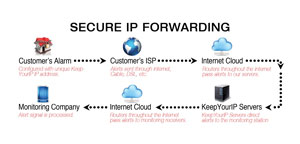
|
|
KYI provides a reliable method for alarm dealers to retain control of which central station their IP accounts report to, by providing an IP-signaling forwarding system using a private static IP address that can be forwarded to different central station IP receivers when needed. ILLUSTRATION COURTESY OF KEEP YOUR IP
|
Having watched the electronic security industry grow over the past 35 years, I found that what happened in the 1980s is here again. Before the introduction of the digital communicator around 1977, each alarm company had its own central station with leased, direct-wire types of connections to clients’ systems. Once the digital dialer demonstrated that alarm signals could be reliably transmitted over a client’s existing POTS (Plain Old Telephone Service) telephone line, along came the advent of the “800-number” or “contract” central station. This disruptive technology provided explosive growth for our industry, as alarm installation companies did not need to operate their own central station to provide monitoring for their subscribers’ accounts.
Once the contract central station business model took hold, dealers soon realized that it could be difficult, if not impossible, to change central stations, which required a dealer to roll a truck to every account and re-program the alarm panels to the new central station telephone number. Maybe you remember the various IC chip burners that were required for each manufacturer’s panels. You youngsters who only know keypad or downloading programming have it easy. In my day, we had to burn the programmed chips in a driving snow, going uphill all the way.
To provide more control over their accounts, many alarm companies installed their “own” telephone line(s) in their contract central station. This provided the ability to change the accounts relatively easily to a new central station, or if the dealer’s account base became large enough the dealer could start his own central station. Some dealers went to the extent of purchasing the receiving equipment, as well as leasing the telephone line(s) and housing it at their contract central station.
Today many security dealers are being forced to abandon the traditional digital communicator as end-users dump their POTS lines in favor of cell phones and VoIP. To get the signals to the central station (and to create RMR) security companies are installing cellular and/or IP alarm transmitters. These devices can require additional wiring and may force the replacement of functional alarm panels and keypads that do not play nicely with the new breeds of alarm transmitters.
My faithful readers know where I stand on the alarm signal issue; IP alarm transmission is the only way to go for smart alarm dealers. The cellular carriers have demonstrated that they don’t care about alarm transmitters, as they don’t generate hundreds of minutes a month in billings. The form and function of the Internet must remain the same, as there are billions of devices currently using the IP protocols and communications as they exist today. It’s too late to change the Internet, so dealers can install IP alarm transmitters with the knowledge that they won’t have to replace them every three years as we are seeing with cellular alarm transmission technologies.
Here is where the situation is the same as it was in the 1980s. Contract central stations are providing their dealers with specific static IP addresses and software ports to connect remote IP alarm transmitters to the central station. In general, every manufacturer of control panels will have a separate IP address and port number at the central station. If a dealer programs a quantity of alarm panels to communicate with a specific central station over IP, that dealer is in the same fix as above; to change central stations the dealer will need to run around town reprogramming control panels. Lots of no-charge service calls; lots of explanations to clients.
These factors will make it very difficult for security dealers using IP alarm transmitters to retain freedom of choice in the central station they use, and installation companies will not have control of their accounts. Security companies need to retain control over their central station connections, if only to protect their clients from a financial collapse or a natural disaster that might befall their current central station. How would you provide monitoring for your IP-transmitted accounts in the event of a central station disruption? Furthermore, if all of your IP alarm transmitters need to be field reprogrammed, how much would you have to discount your accounts when you want to sell out?
One of the beauties of the Internet is that there are many methods by which to communicate from one device to another. One company, KYI (Keep Your IP) Inc., Irvine, Calif., is providing a vital service that every forward-thinking security company should be using for their IP alarm transmitters. For $20 per month, KYI will provide a security dealer with his or her own specific, static IPV4 address that will forward all communications to the IP address of the receiver in the central station of their choice. The dealer programs the receiver’s static IP and software port number on their secured online account at KYI.
KYI servers are inside U.L.-listed co-location facilities (the same sort of installations that Google uses) on each side of the continental United States. This provides redundancy in the event of a major Internet problem so that the alarm signals will make it to the central station.
According to Davin Roos, founding partner of KYI, most of their dealers will purchase a dual IP address package, giving them two separate static IP addresses for $40 monthly. As many alarm panels provide the ability to program two IP addresses for alarm reporting, these dealers are providing a redundant communications path through the Internet for their clients. Note that for each manufacturer of alarm controls a dealer is installing, separate KYI static IP addresses likely would be needed.
Dealers who wish to change their IP accounts from one central station to another just need to access their secured account and put in the new static IP addresses of the receivers at the new location. The IP path will change at the top of the next hour, and the accounts are directed to the new central station.
This service also has great possibilities for redundancy between central stations operated directly by installing dealers, or companies that have more than one central station location. If a natural or man-made disaster occurs, the IP alarm signals can be sent quickly to an alternative central station. KYI provides a 24/7 service that allows dealers to transfer accounts immediately by manually changing the destination IP address.
For information, visit KYI at www.KeepYourIP.com or 866-444-7007.






